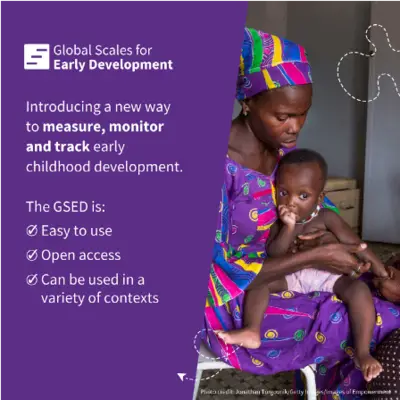What is the Global Scales for Early Development?
The Global Scales for Early Development (GSED) is a new tool that assesses the development of children under age 3 from around the world. It captures cognitive, socio-emotional, language, and motor skills, providing a “developmental score” (D-Score) to give an overall picture of children’s development. Designed to track children’s developm
 ent over time, the GSED measures populations, not individuals.
ent over time, the GSED measures populations, not individuals.
RTI Distinguished Fellow Maureen Black helped create the GSED, and recently participated in a World Health Organization (WHO) webinar introducing this new tool to the international community. On the day of its launch, we sat down with her to learn some background about early childhood development, and why GSED fills an important gap.
Interview with GSED Contributor Maureen Black
Why is gathering better data on early childhood health and development a pressing need?
We have seen dramatic changes in child health and development over the past 4 decades. The United Nations made reducing childhood mortality one of eight Millennium Development Goals. From 1990 to 2000, the global under-5 mortality rate dropped by 60%, from 93 deaths to 37 deaths per 1000 live births. With more children surviving, the fertility rate declined, families were smaller, and parents wanted their children to be educated. UNICEF reports that by 2021, primary school attendance reached 87%; completion among attendees was approximately 80%.
Adversities during infancy and toddlerhood, such as malnutrition, have long term negative consequences on school performance and health that extend into adulthood. Interventions before three years of age improve children’s development and reduce the negative consequences of adversities. In the absence of measures to determine the number of children experiencing adversities, stunting and poverty served as proxies to estimate that more than 200 million children under age 5 were developmentally at risk and therefore could benefit from interventions.
The UN’s Sustainable Development Goals (SDG), announced in 2015, track young children’s care and access to pre-primary education. Stunting and poverty are not sensitive enough to meet SDG reporting guidelines or to measure programmatic changes in children’s development. That is where GSED comes in.
Tell us about how the GSED fills a need for countries looking to improve the health of their children, and the international development professionals who help make that a reality
Until we created GSED, no reliable, freely accessible tools existed for population-level monitoring of children up to age 3. Although there are many highly precise methods to assess individual children, they are time intensive, expensive, and require highly trained examiners, and therefore are not appropriate for populations. We also need a measure that is sensitive to changes in children’s development resulting from program interventions. The GSED was developed to fill these gaps.
GSED meets the criteria for a population-level measure. It is valid, reliable, Open Access, and yields a score that is easy to interpret. As an app-based tool, it is quick and easy to administer, requiring minimal training. Putting this tool into the hands of governments around the world builds equity by enabling local leaders to identify where to implement interventions to ensure that young children reach their developmental potential.
Data from GSED can help advocates steer the way toward better services for children. They can demonstrate why countries need to invest in healthy early development programs. Governments can also measure the effectiveness of their interventions, improving them over time. The GSED is an essential source of data that will contribute to the healthy growth of children globally, which supports achievement of the Sustainable Developmental Goals.
How can researchers learn more about GSED and integrate it into their work?
Visit WHO's website. The site shows that a multidisciplinary team created and evaluated GSED, supported by international agencies, including UNICEF, the World Bank, UNESCO, Inter-American Development Bank, USAID, the Bill and Melinda Gates Foundation and others. Ensuring that GSED is open access means that it can be downloaded and used throughout the world. GSED data contribute to our understanding of early childhood development and to our goal of progress toward a healthier world.
RTI Fellows strive to build a better global future by conducting high impact research, mentoring the next generation of scientific leaders and fostering the culture of inclusive and innovative science at RTI. To learn more about the Fellow Program, please visit the program’s website.

